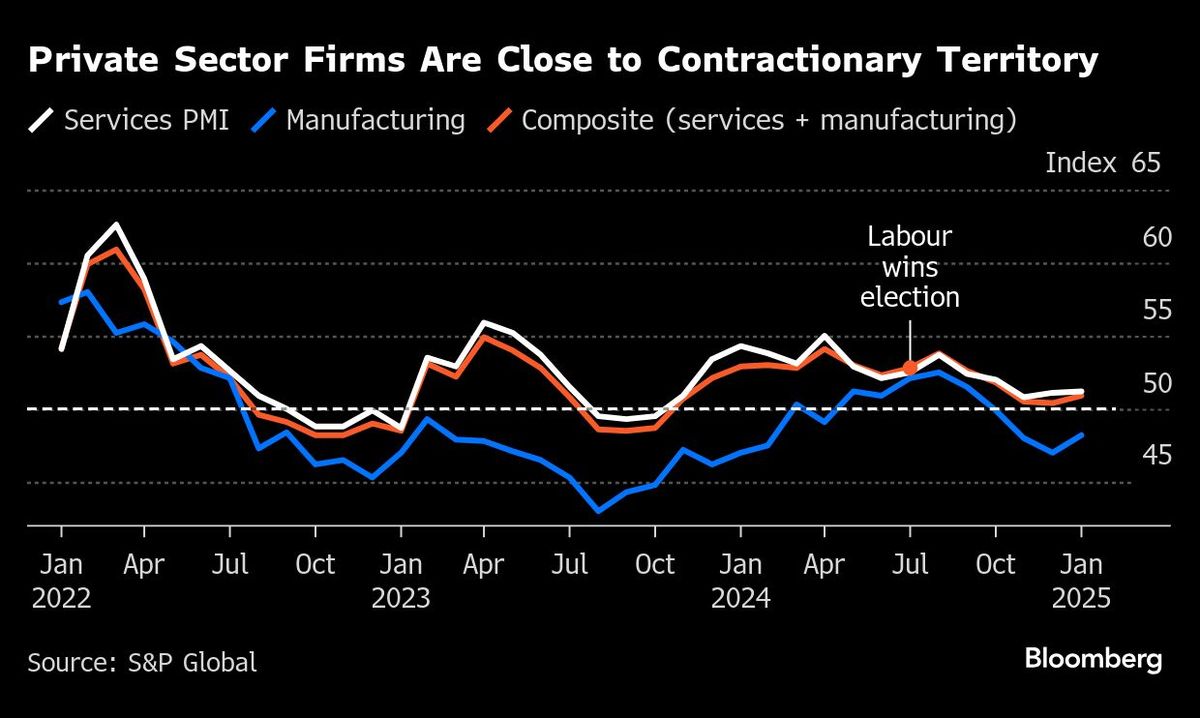
S&P Global's purchasing manager index edged up to 50.9 in January from 50.4 in December. S&P said the rate of job-cutting in January and December was the fastest since 2009, not counting the Covid pandemic.
(Jan 24): Stagflation fears stalked Britain at the start of 2025 with a closely watched survey showing jobs being slashed at a pace seen in the aftermath of the financial crisis.
S&P Global said its composite purchasing manager index (PMI) edged up to 50.9 in January from 50.4 in December. It was slightly better than economists’ expectations, yet remained only narrowly above the 50 threshold separating growth and contraction.
S&P said the rate of job-cutting in January and December was the fastest since 2009, barring the pandemic. Firms cut headcount for a fourth straight month.
The warning comes days after J Sainsbury plc, the country’s second-largest grocer, announced 3,000 roles would go — including a 20% reduction in senior management — and that of all its remaining in-store cafes will close.
Cost pressures for businesses rose at the fastest pace since May 2023, the PMIs showed. Prices charged by firms also climbed at the quickest rate in 18 months.
The survey suggests that gloom still hangs over UK businesses after their confidence was sapped by hefty tax rises in Labour’s first budget and a darkening economic outlook at home and abroad.
Chris Williamson, chief business economist at S&P Global Market Intelligence, said inflationary pressures have reignited, “pointing to a stagflationary environment which poses a growing policy quandary for the Bank of England”.
He added that companies have been “cutting employment amid falling sales and concerns about business prospects”.
There were also worrying signs ahead with expectations for activity sinking to the lowest since the aftermath of Liz Truss’ short-lived premiership in late 2022. New work fell at the fastest pace in over a year.
The pound extended gains, trading as much as 0.8% higher at US$1.0501, its strongest level in over two weeks. Gilts ticked lower across the curve, with 10-year yields up two basis points to 4.66%.
Growth slowed down sharply in the second half of 2024. The UK economy failed to expand in the third quarter and the Bank of England expects a flat fourth quarter as well after a plunge in business and consumer confidence.
“While the stalled economy and deteriorating jobs market suggest there’s an increased need for rate cuts to stimulate growth, the rise in price pressures hints that the inflation genie is by no means back in its bottle,” Williamson said.
Uploaded by Felyx Teoh
- Gas pipeline blaze: Petronas Gas, Gas Malaysia’s shares open marginally lower after trading halt
- Gas pipeline blaze: MIDF flags potential RM18m impact to Petronas Gas
- T7 Global drops to two-year low, triggers short-selling halt after deputy chairman's departure
- Digital banks in Malaysia urged to re-examine strategies to better serve B40 segment
- Police to look into allegations that digging caused gas pipeline fire

